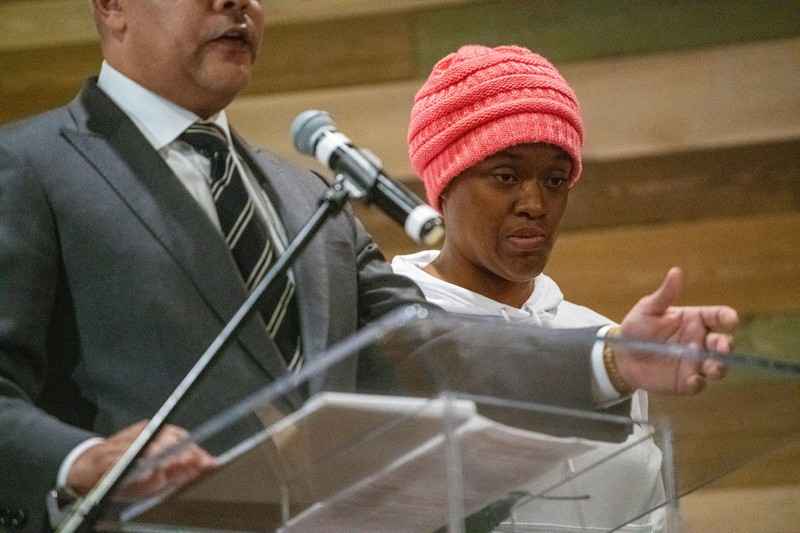Families, activists call for change after 7 Cobb jail deaths, lockdown
By Kristal Dixon | The Atlanta Journal-Constitution | December 9, 2019
Hundreds of residents, community activists and elected officials got an earful Monday from family members of inmates who’ve died or experienced a long-term lockdown at the Cobb County Detention Center.
The ACLU of Georgia, Cobb County Southern Christian Leadership Conference, La Gente de Cobb and the Cobb County NAACP hosted a town hall meeting to discuss the conditions at the Cobb County jail.
These families have sent a steady stream of letters and emails to the ACLU informing the organization about the lockdown at the jail, said Kosha Tucker, a staff attorney with the ACLU.
The Cobb County Sheriff’s Office said that lockdown began around Sept. 27 and ended Oct. 25.
Tucker said families were not allowed to visit or call their relatives who are incarcerated at the jail. She also said inmates were not allowed to purchase snacks or hygiene items.
“These are still very alarming concerns and that’s why we are here tonight to listen to all of you (and for you) to let us know what you’ve experienced,” she said.
During the lockdown, the inmates were sequestered in their cells for nearly 24 hours a day, with only 15 minutes to shower, Cobb County Sheriff’s Office spokesman Glenn Daniel confirmed to The Atlanta Journal-Constitution.
Cobb County Sheriff Neil Warren and his department have come under fire after seven inmates have died while in custody during the past 12 months. Those seven inmates were:
•Christopher Lawrence Hart of Marietta died Nov. 17 experienced a “medical emergency believed to be related to preexisting conditions” Nov. 16 while at the jail.
•Kevil Wingo, 36, died Sept. 29 after experiencing a “medical emergency” in his cell, the sheriff’s office said. The investigation into his death is pending.
•William Kocour, 63, died Sept. 10 after suffering a medical condition that required him to be hospitalized. Koncour was transferred to hospice care where he died, Daniel said. The investigation remains active.
•Steven Davis, 37, was in custody at the Cobb jail when he experienced a “medical emergency” and was taken by ambulance to an area hospital where he died June 8. His death is under investigation by the Cobb Medical Examiner’s Office.
•Bradley Emory, 33, was found unresponsive in the shower with a sheet around his neck March 10, according to a report from the Cobb County Medical Examiner’s Office. The county medical examiner ruled Emory’s death a suicide.
•Jessie Myles, 31, died Feb. 25, three days after he was arrested by Marietta police for drug possession. Myles suffered an unexplained medical event and was taken to Kennestone Hospital where he was pronounced dead. A Cobb County Medical Examiner’s report declared the death an accidental overdose. The report said Myles was captured on video taking a baggie from his pocket and ingesting it while he was being driven to the jail in a police car. While in a holding cell, he “appeared normal for a few hours,” but suddenly began displaying “seizure-like activity.”
•Reginald Wilson, who suffered from schizophrenia and bipolar disorder, died of dehydration Dec. 29, 2018, after nine days in the jail. After he was booked into the jail Dec. 20, Wilson displayed abnormal behavior and was transferred to solitary confinement. A Medical Examiner’s report states Wilson was given food and beverage, but did not drink enough liquid. He was later found unresponsive in his cell and declared dead.
Timothy Gardner, the attorney representing the family of Kevil Wingo, appeared at the town hall with Wingo’s sister, Tiffany. Gardner said his investigation into Wingo’s death revealed that the sheriff’s office and its medical staff allegedly “failed to give him the appropriate medical attention he deserved.”
 |
| MARIETTA, Ga. -- From left, Attorney Timothy Gardner speaks for his client Tiffany Wingo at a town hall meeting to discuss the conditions at the Cobb County Detention Center Monday, Dec. 9, 2019 at Life Church in Marietta, Ga. Wingo’s brother, Kevil, died in the hospital after experiencing an unspecified medical emergency at the jail, which is still under investigation. PHOTO BY ELISSA BENZIE |
He also said no one at the sheriff’s office reached out to the Wingo family following the death to offer condolences for their loss. When he and members of the family finally scheduled a meeting with sheriff’s office staff, Gardner said that meeting was cancelled without any explanation.
“These conditions are so extreme that every expert I’ve talked to in my case has said they’ve never seen anything like it,” he said.
One former inmate, Doug Jenkins, said he was released Sunday evening from the Cobb County Detention Center after spending about five months at the facility.
Jenkins, who was incarcerated at the jail during the lockdown, said being relegated to one’s cell for nearly 24 hours a day is enough to drive an inmate to consider accepting a guilty plea “because you don’t know how much longer you’re going to sit in there.”
Jenkins told the audience he was guilty of the crime he committed, but said he and other inmates “didn’t deserve to be on lockdown.”
The Cobb sheriff’s office currently has about 2,100 inmates housed at the jail. It receives and releases about 25,000 people per year, Daniel said.
The department argues that many of its inmates have a variety of preexisting medical conditions and as well as mental health conditions. Its medical staff provide initial health screening as well as ongoing medical treatment through third-party healthcare providers,” the sheriff’s office previously said.